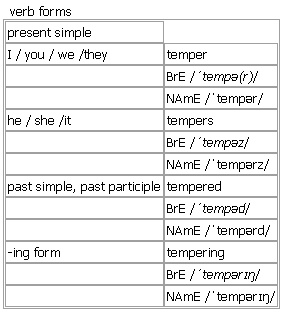 temper
temper

tem·per [temper tempers tempered tempering] noun, verb BrE [ˈtempə(r)] NAmE [ˈtempər]
noun
1. countable, usually singular, uncountable if sb has a temper, they become angry very easily
•a violent/short/quick, etc. temper
•He must learn to control his temper.
•She broke the plates in a fit of temper.
•After an hour of waiting, tempers began to fray (= people began to get angry).
2. countable, usually singular a short period of feeling very angry
•to fly into a temper
•She says awful things when she's in a temper.
•Some small children have terrible temper tantrums.
3. countable the way that you are feeling at a particular time
Syn: ↑mood
•Come back when you're in a better temper.
•to be in a bad/foul, etc. temper
4. -tempered (in adjectives)having a particular type of temper
•good-/bad-tempered
•a sweet-tempered child You will find other compounds ending in -tempered at their place in the alphabet.
more at have a quick temper at ↑quick adj.
Word Origin:
Old English temprian ‘bring something into the required condition by mixing it with something else’, from Latin temperare ‘mingle, restrain’. Sense development was probably influenced by Old French temprer ‘to temper, moderate’. The noun originally denoted a proportionate mixture of elements or qualities, also the combination of the four bodily humours, believed in medieval times to be the basis of temperament, hence senses 1 to 3 (late Middle English). Compare with ↑temperament.
Example Bank:
•Frayed tempers at the end of the match led to three players being sent off.
•He broke the chair in a fit of violent temper.
•He had to learn to keep his temper under control before he could become a teacher.
•He has a nasty temper.
•He stormed out of the room in a temper.
•I only just managed to keep my temper with him.
•I wasn't in the best of tempers when I arrived at the meeting.
•Peter's comments were responsible for her ill temper.
•She loses her temper at the drop of a hat.
•She loses her temper easily.
•She regained her good temper after a chat.
•Tempers flared as the traffic jam became worse.
•After an hour of waiting tempers began to fray.
•He has a short/quick temper.
•She says awful things when she's in a temper.
•You must learn to control your temper.
Idiom: ↑lose your temper
verb
1. ~ sth (with sth) (formal)to make sth less severe by adding sth that has the opposite effect
•Justice must be tempered with mercy.
•The hot sunny days were tempered by a light breeze.
•His delight was tempered by regret.
2. ~ sth (technical)to make metal as hard as it needs to be by heating and then cooling it
•tempered steel
Verb forms: 
Word Origin:
Old English temprian ‘bring something into the required condition by mixing it with something else’, from Latin temperare ‘mingle, restrain’. Sense development was probably influenced by Old French temprer ‘to temper, moderate’. The noun originally denoted a proportionate mixture of elements or qualities, also the combination of the four bodily humours, believed in medieval times to be the basis of temperament, hence senses 1 to 3 (late Middle English). Compare with ↑temperament.
Example Bank:
•His delight was tempered by regret that his father was not there.
|
|
